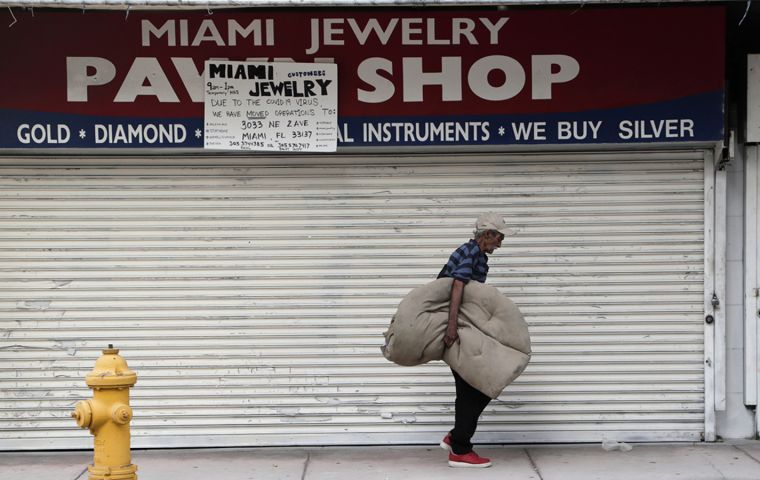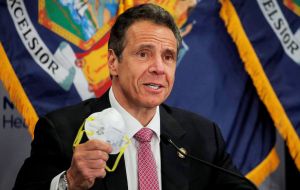MercoPress. South Atlantic News Agency
Fed says US households will need more fiscal support and forecasts 20% unemployment
 The Fed has rolled out a range of lending programs and slashed interest rates to zero, but cannot give out money in the form of grants or tax relief as the U.S. Congress can
The Fed has rolled out a range of lending programs and slashed interest rates to zero, but cannot give out money in the form of grants or tax relief as the U.S. Congress can  U.S. unemployment is likely to peak at 20% or higher, and then to fall only to 8% and 10% by year's end, Dallas Federal Reserve Bank President Robert Kaplan said
U.S. unemployment is likely to peak at 20% or higher, and then to fall only to 8% and 10% by year's end, Dallas Federal Reserve Bank President Robert Kaplan said United States businesses and households are going to need more fiscal support to get through what will likely be a longer period of recovery from the coronavirus shutdown than initially expected, Federal Reserve policymakers said on Tuesday.
Unemployment will get worse around the country and the economic recovery will be uneven, they said.
U.S. unemployment is likely to peak at 20% or higher, and then to fall only to between 8% and 10% by year's end, Dallas Federal Reserve Bank President Robert Kaplan told CNN International. The U.S. unemployment rate was 14.7% in April.
“There may well need to be more fiscal stimulus in order to boost economic growth so that we can grind down that unemployment and get closer to full employment,” Kaplan said.
Even as lawmakers and the White House tangle over how much aid should go to what parts of the economy and when, Fed officials have stressed more money, quickly. Other Fed
policymakers including Richmond Fed President Thomas Barkin and Minneapolis Fed President Neel Kashkari echoed Kaplan's view on Tuesday.
The Fed has rolled out a range of lending programs and slashed interest rates to zero, but cannot give out money in the form of grants or tax relief as the U.S. Congress can. Lawmakers
have committed nearly US$3 trillion in rescue funds so far.
“In this crisis, the U.S. government has the ability to raise the funds to support the American people,” Kashkari said in a separate online interview.
The speed of economic recovery, Fed policymakers also noted, will depend heavily on how safe Americans feel, and will be uneven not only from place to place but sector to sector.
“It's really not up to the governors and the president when we reopen - it is up to the American people: when everybody feels safe to take their families back out to dinner or to a movie or to a ballgame,” Kashkari said, adding that he does not plan to go see a movie until a vaccine or treatment is available.
“We’re not going to fix our economy until we get our hands around the virus,” he said. “We might just have this uneven crawling back up to more of a normal economy.”
Uneven was also the adjective Philadelphia Fed President Patrick Harker used to describe the recovery.
Over the past few weeks, Fed policymakers have emphasized the importance of widespread testing and contact tracing as key to preventing a new surge of infections. Requiring physical distancing and other safety protocols, they note, may reduce efficiency in some workplaces and in others make resuming work to pre-crisis levels a near impossibility.




Top Comments
Disclaimer & comment rulesCommenting for this story is now closed.
If you have a Facebook account, become a fan and comment on our Facebook Page!